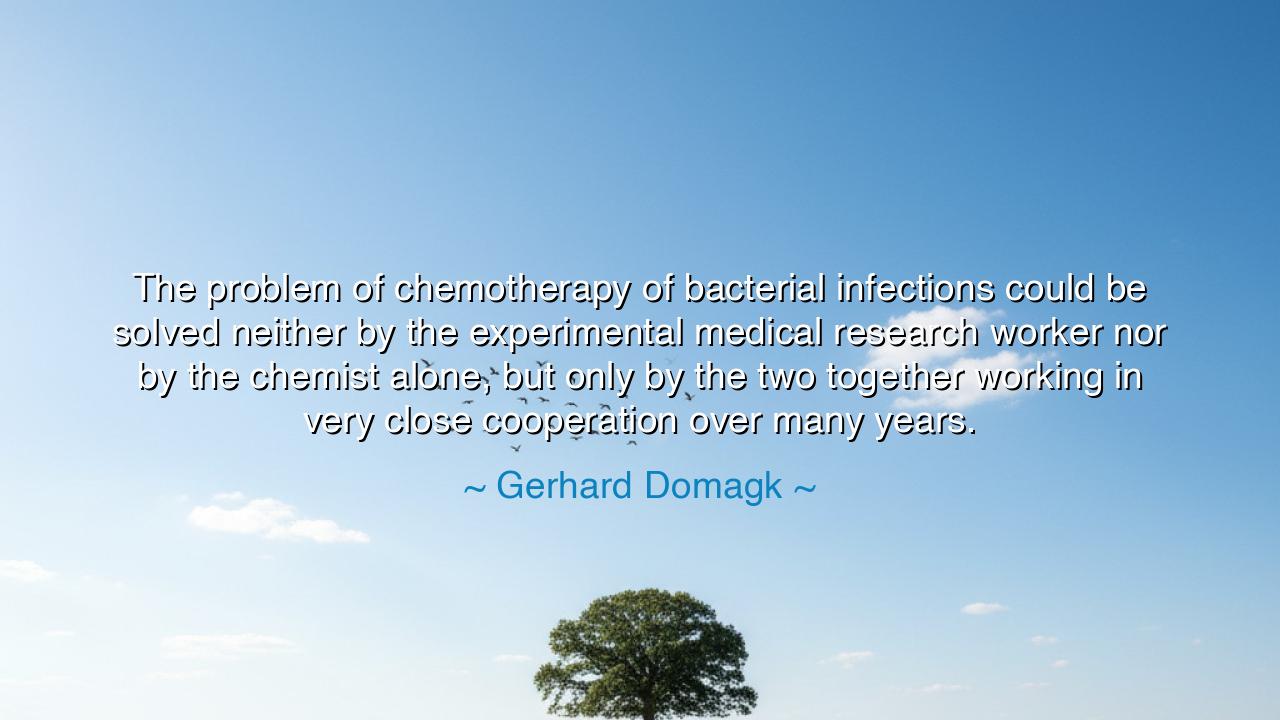
The problem of chemotherapy of bacterial infections could be
The problem of chemotherapy of bacterial infections could be solved neither by the experimental medical research worker nor by the chemist alone, but only by the two together working in very close cooperation over many years.






The words of Gerhard Domagk—“The problem of chemotherapy of bacterial infections could be solved neither by the experimental medical research worker nor by the chemist alone, but only by the two together working in very close cooperation over many years.”—speak with the timeless voice of wisdom, for they proclaim the necessity of unity in the pursuit of human progress. They remind us that no single discipline, no solitary genius, can shoulder the vast burdens of discovery. It is only in the meeting of minds, in the merging of gifts, that miracles are born.
At the heart of this declaration lies the essence of cooperation. The medical research worker, with eyes set upon the living body, could observe the ravages of disease but lacked the tools to design new molecules to counter it. The chemist, skilled in the dance of elements and bonds, could craft substances of power, but without knowledge of how they interacted with flesh and blood, his creations remained only powders and potions. Alone, each was incomplete. Together, they became a force that reshaped destiny, birthing the age of chemotherapy and saving untold lives.
The ancients, too, knew the power of union. When Hippocrates studied the causes of disease, he did not work in isolation but drew upon philosophy, observation, and practical experience. In Alexandria, the great Library gathered scholars of many fields, for it was understood that truth emerges not from one stream, but from the confluence of many rivers. Domagk’s teaching echoes this eternal principle: that greatness is forged not in solitude but in the fellowship of minds bound by a shared purpose.
History gives us a luminous example in Domagk’s own life. It was through his collaboration with chemists at Bayer that he discovered Prontosil, the first sulfonamide drug. This compound opened the door to modern antibacterial chemotherapy, turning once-fatal infections into curable conditions. The victory was not his alone, but the fruit of years of patient labor between scientists of different worlds—labor rooted in humility, persistence, and mutual respect. Their work stands as testimony to the truth that the mightiest triumphs are communal.
The emotional force of his words lies in their humility. Domagk did not claim that genius alone could conquer disease. He admitted openly that progress required many years of shared effort. This truth humbles the proud who believe they can achieve alone, and it comforts the weary who labor slowly, reminding them that time and perseverance, joined with the strength of others, are the true ingredients of victory.
The lesson for us is clear: seek cooperation over isolation. In every endeavor, whether in science, art, or the building of societies, the lone worker achieves less than the united fellowship. Practically, this means listening deeply to the strengths of others, honoring knowledge outside of one’s own field, and weaving together diverse talents into a shared fabric of achievement. The chemist must honor the physician, the physician the chemist, and both must bow to the truth of nature.
Thus, Gerhard Domagk’s words stand as a call to future generations: do not walk alone when the path demands many feet. For the enemies of humanity—disease, ignorance, injustice—are vast and enduring, and no single craft or skill can overthrow them. Only together, across years of toil, can humanity triumph. Let this wisdom be carried forward: that cooperation is not weakness, but the highest expression of strength, and that through it, the greatest healings of the world are made possible.






AAdministratorAdministrator
Welcome, honored guests. Please leave a comment, we will respond soon